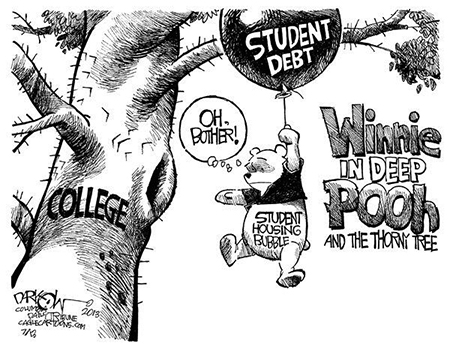By Chris Miller
The Renegade Rip Bakersfield College
Pros
The words “free education” have been thrown around lately as if they are meaningless or something. Free education is not an issue to be taken lightly.
Certainly everyone reading these words will find it to be a serious issue. It has been offered in several other countries that we consider ourselves equal with, if not superior to, such as France, Malta, Scotland and the United Kingdom.
Here in America we have gotten used to thinking that we should pay for everything like our basic services.
Health care and education are as basic as road maintenance and defense against foreign attack.If our taxes do not pay for these things then what exactly are we paying for?
Our constitution does not allow for the federal government to tax us at all. So if we are tolerating taxation from our government, should we not be expecting it to provide all of these basic services?
I say yes! I believe that my government owes me a fair chance to make my own living no matter my race, background, or financial capabilities.
There should be more of a cry from our own public to demand these kinds of things be taken seriously. Certainly student debt is at an all-time high.
The average student graduating today with a serious degree, like a master’s, is facing more than ten years of debt before they are able to live for themselves. If medical expenses like a new baby or a dying parent should interfere with their ability to repay that loan without incurring more debt they will spend even more time working to repay something which a foreign competitor never had to overcome at all.
There is also the matter of who is taking our money. Why should anyone be profiting from this kind of malarkey?
Therefore, it is a basic necessity that higher education is provided for free so that the resulting young professionals will be in a position to provide the most contribution to their society possible.
The fact that very little movement has happened on this issue should make you very angry because, fair student, it is a direct assault against your future.
It also forces people like me and you to go over to the SGA and participate in programs like the Renegade Pantry (which provides free food to students who are willing to say they need it).
Education is the most important thing for a young person to be concerned with. I cannot understand why it is not a more prevalent conversation in our modern pop culture.
Perhaps when the debt has finally risen to the point that children are growing up while their parents still have not paid there student debt off someone will take action.
Cons
The life of a student is an expensive one. As prices for food, utilities, and health insurance continue to rise, it’s becoming increasingly difficult to set aside money for school into an already tight budget, even with multiple part time jobs.
It’s easy to see why many are clamoring to make college education free. However, what many people seem to forget is that nothing is ever free.
The money to pay for the myriad of programs, services, and opportunities many colleges, including our own, offer has to come from somewhere. That “free” college education wouldn’t exactly be free.
Who would pay for those many expenses should college become “free?” Well, that would be the same people who pay for every other public service or social program in the United States, the taxpayers.
Taxpayer money is used to fund everything people take for granted as “free.” Kindergarten through 12th grade education provided by public school institutions isn’t free.
That too is funded by taxpayer dollars via property tax. If college were to be treated the same as lower levels of education and become “free,” that would mean either a brand new tax would be created to pay for it or one or more already established taxes would rise to offset the cost.
In a 2010-2011 study, it was found that the average tuition and fees for a full-time student enrolled in a public two-year institution was $2,713 plus another $7,259 for off-campus room and board as well as another $1,113 for books and supplies.
These numbers are relatively higher now due to price fluctuations and increased fee costs depending on the schools in question.
If college is so expensive, even at the two-year level, for one singular student, wouldn’t that mean that the total collective cost of tuition and other expenses for an entire institution’s student body combined be astronomically high?
Since, logically, that is the case, wouldn’t it also be logical to conclude that the amount of money taxpayers, even those who are not themselves attending any form of college, would have to fork out to pay for all of these students nationwide be ludicrously high as well?
According to the same study, roughly 16% of most community college’s revenue comes from student tuition and fees. That number is even higher at a four-year school.
Around 70% of a community college’s revenue comes from government grants and appropriations, which, as most know, comes out of taxpayers pocket already.
That means if college education were to become “free,” that’s a possible 16% tax hike on the nation as a whole, which could make the difference of a family of four being able to keep up house payments or not.
Nothing in this world is free and no matter how you look at it, college never will be either.

